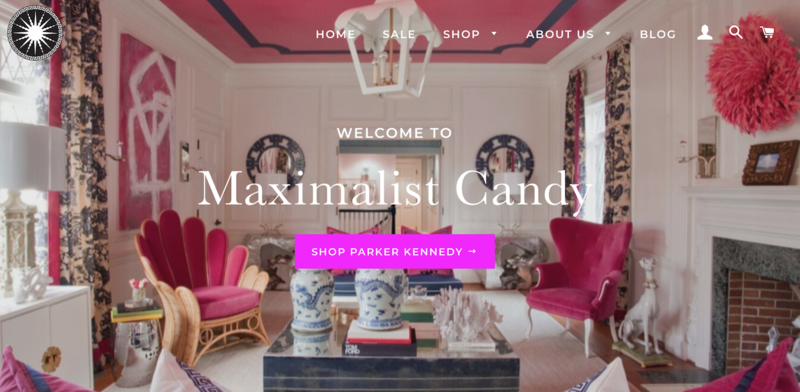Hide your Scandinavian furniture and cans of gray paint—a new e-commerce platform dedicated to the big, bold and bright is here. Officially launched in January, Maximalist Candy offers a curated selection of jewelry, decor and antiques that taps into the “More is more” lifestyle. A brief selection: a handmade malachite box with golden serpent lid ($475), a pair of highland ceremonial drums ($2,500) and a marble fireplace mantel once owned by Doris Duke ($98,000).

The site is the brainchild of HSN and Hudson Jeans e-commerce veteran Tim Scully and design-world marketing professional Kurt Miller. Four years ago the pair bonded over their shared love of Tony Duquette and discussed a collaborative project, but felt the moment wasn’t quite right. Last year, professional circumstances aligned for the partners, and they hung up a digital shingle.
Maximalist Candy is (very) young, but its high-concept mission has struck a nerve. In the span of weeks, the site’s Instagram account has accrued 40,000 followers—and those followers are buying: “A good conversion rate in e-commerce is 1.4 percent,” Scully tells Business of Home. “There was one day when our conversion rate was 124 percent.”
The site’s model is simple—Scully and Miller connect buyers directly with sellers and take a percentage from the sale. They’ve partnered with several designers to curate pop-up shops within the store, including Robert Passal, Scot Meacham Wood, Timothy Corrigan and Danielle Rollins.
Scully thinks the site is tapping into a cultural moment for the big and bold, the shaking off of a long winter of faux-humble minimalism that followed the 2008 recession. “People are over it, the Restoration Hardware-ing of America, the Chip and Joanna Gaines–ing of America,” says Miller. “They want color and vibrancy and unique pieces.”
 People are over the Restoration Hardware-ing of America, the Chip and Joanna Gaines–ing of America.
People are over the Restoration Hardware-ing of America, the Chip and Joanna Gaines–ing of America.—Kurt Miller
Maximalism may be enjoying a moment. E-commerce certainly is. The volume of online sales in the home goods space increases every year, while ready-made software like Shopify strips away the traditional barriers between sellers and buyers. There are e-commerce sites based on narrowly sliced age and gender demographics, life events, hobbies, celebrities—why not an online marketplace dedicated to an aesthetic movement?
It helps that Scully and Miller have an expansive view of their muse. “A midcentury modern home surrounded by an infinity pool—that’s maximalism,” says Scully. “It’s not about a specific look. Not everything has to be Zsa Zsa Gabor’s bedroom. It’s about turning up the volume on your life.” Iris Apfel is maximalism, as is Fornasetti. It’s almost easier to clarify what it isn’t. For example, the opposite of Scully and Miller’s site? “Goop,” Scully replies, without hesitation. Enough said.

The enthusiasm of Maximalist Candy’s founders will go a long way, as will a strong curatorial vision—catnip for designers and editors (guilty as charged). Of course, e-commerce is tough. The information superhighway is littered with the skeletons of those who have tried and failed to carve out a slice of online cash (the recent folding of The Maryn’s shop is a case in point). Logistics can be tough, returns are hell, and margins are slim.
But worries like that will come later. For now, Scully and Miller are trying to focus on building a compelling destination for their fellow maximalists. They’re adding content, reaching out to new guest curators, and looking into pop-up shops in London and the Hamptons. As for the bigger picture? “Charlotte Moss told me she loved the site, and suggested we have a maximalist showhouse,” says Scully. “We already have a Modernism Week—what about Maximalism Week?”




























